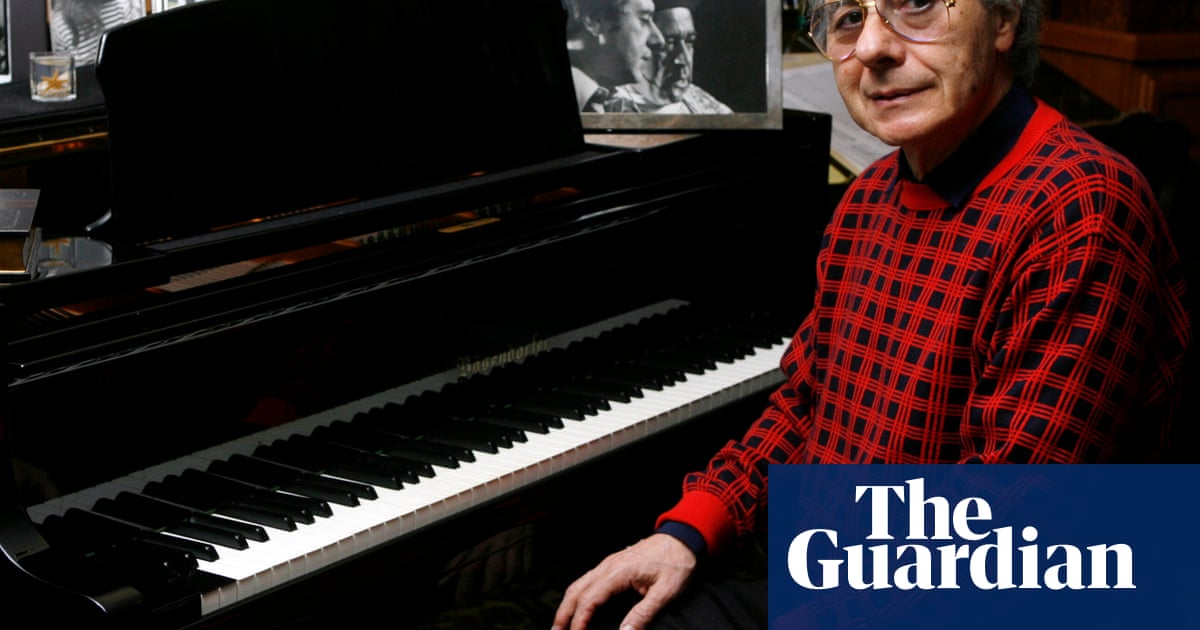Lalo Schifrin, the composer who wrote the endlessly catchy theme forMission: Impossibleand more than 100 other arrangements for film and television, has died aged 93.
Schifrin’s sons, William and Ryan, confirmed the composer died on Thursday of complications from pneumonia.
The Argentinian won four Grammys and was nominated for six Oscars, including five for original score for Cool Hand Luke, The Fox, Voyage of the Damned, The Amityville Horror and The Sting II.
“Every movie has its own personality. There are no rules to write music for movies,” Schifrin told the Associated Press in 2018. “The movie dictates what the music will be.”
He also wrote the grand finale musical performance for the World Cup championship in Italy in 1990, in which the Three Tenors – Plácido Domingo, Luciano Pavarotti and José Carreras – sang together for the first time. The work became one of the biggest sellers in the history of classical music.
Schifrin, also a jazz pianist and classical conductor, had a remarkable career in music that included working with Dizzy Gillespie and recording with Ella Fitzgerald, Count Basie and Sarah Vaughan. But perhaps his biggest contribution was the instantly recognizable score to television’s Mission: Impossible, which fueled the just-wrapped, decades-spanning feature film franchise led by Tom Cruise.
Written in the unusual 5/4 time signature, the theme was married to an on-screen self-destruct clock that kicked off the TV show, which ran from 1966 to 1973. It was described as “only the most contagious tune ever heard by mortal ears” by New Yorker film critic Anthony Lane and even hit No 41 on the Billboard Hot 100 in 1968.
“The producer called me and told me, ‘You’re going to have to write something exciting, almost like a logo, something that will be a signature, and it’s going to start with a fuse’,” Schifrin told the AP in 2006. “So I did it and there was nothing on the screen. And maybe the fact that I was so free and I had no images to catch, maybe that’s why this thing has become so successful – because I wrote something that came from inside me.”
When film-maker Brian De Palma was asked to take the series to the silver screen, he wanted to bring the theme along with him – which led to a creative conflict with composer John Williams, who wanted to work with a new theme of his own. Out went Williams and in came Danny Elfman, who agreed to retain Schifrin’s music.
Hans Zimmer took over scoring for the second film and Michael Giacchino scored the next two. Giacchino told NPR he was a hesitant to take it on, because Schifrin’s music was one of his favorite themes of all time.
“I remember calling Lalo and asking if we could meet for lunch,” Giacchino told NPR. “And I was very nervous – I felt like someone asking a father if I could marry their daughter or something. And he said, ‘Just have fun with it’. And I did.”
Mission: Impossible won Grammys for best instrumental theme and best original score from a motion picture or a TV show. In 2017, the theme was entered into the Grammy Hall of Fame.
Born Boris Claudio Schifrin to a Jewish family in Buenos Aires – where his father was the concertmaster of the philharmonic orchestra – Schifrin was classically trained in music, in addition to studying law.
After studying at the Paris Conservatory, Schifrin returned toArgentinaand formed a concert band. Dizzy Gillespie heard Schifrin perform and asked him to become his pianist, arranger and composer. In 1958, Schifrin moved to the US, playing in Gillespie’s quintet in 1960-62 and composing the acclaimed Gillespiana.
Schifrin moved easily between genres, winning a Grammy for 1965’s Jazz Suite on the Mass Texts while also earning a nod that same year for the score of TV’s The Man from UNCLE In 2018, he was given an honorary Oscar statuette and, in 2017, the Latin Recording Academy bestowed on him one of its special trustee awards.
Other film scores included Tango, Rush Hour and its two sequels, Bringing Down The House and Dirty Harry.
It was star Clint Eastwood who handed him his honorary Oscar.
“Receiving this honorary Oscar is the culmination of a dream,” Schifrin said at the time. “It is mission accomplished.”
Schifrin’s conducting credits include the London Symphony Orchestra, the Vienna Symphony Orchestra, the Israel Philharmonic, the Mexico Philharmonic, the Houston Symphony Orchestra, the Los Angeles Chamber Orchestra and the Atlanta Symphony Orchestra. He was appointed music director of Southern California’s Glendale Symphony Orchestra and served in that capacity from 1989-1995.
In addition to his sons, he is survived by his daughter, Frances, and his wife, Donna.
